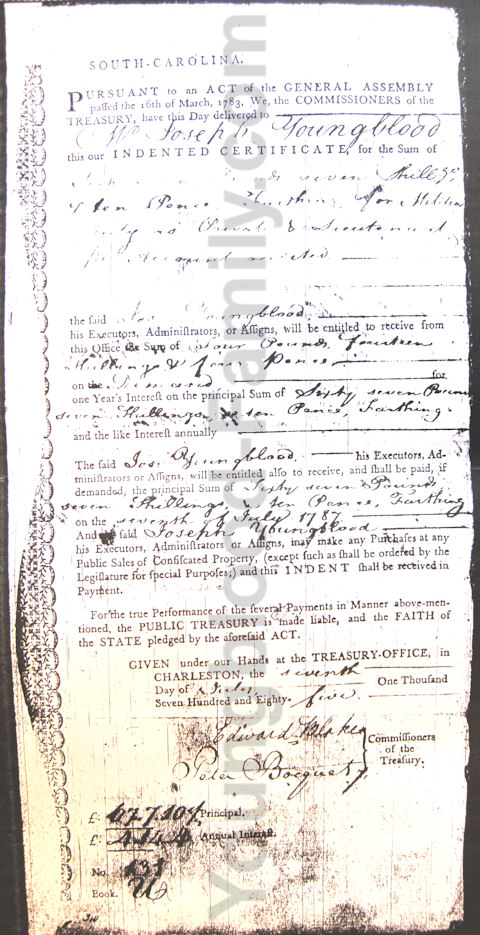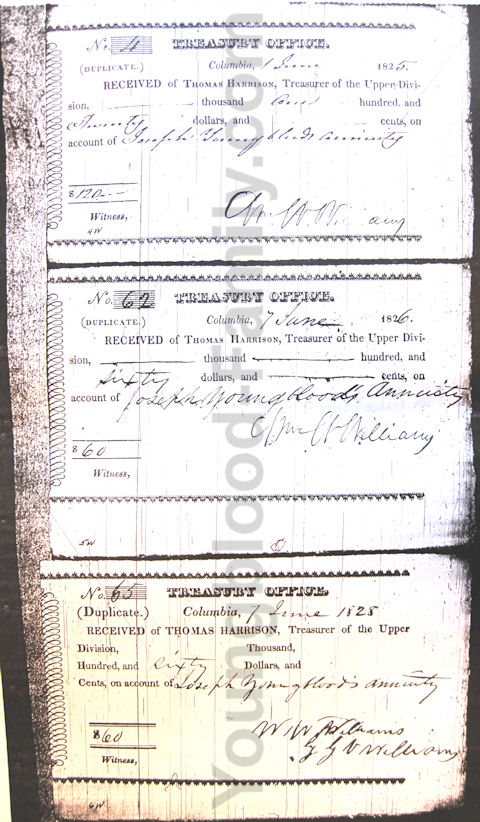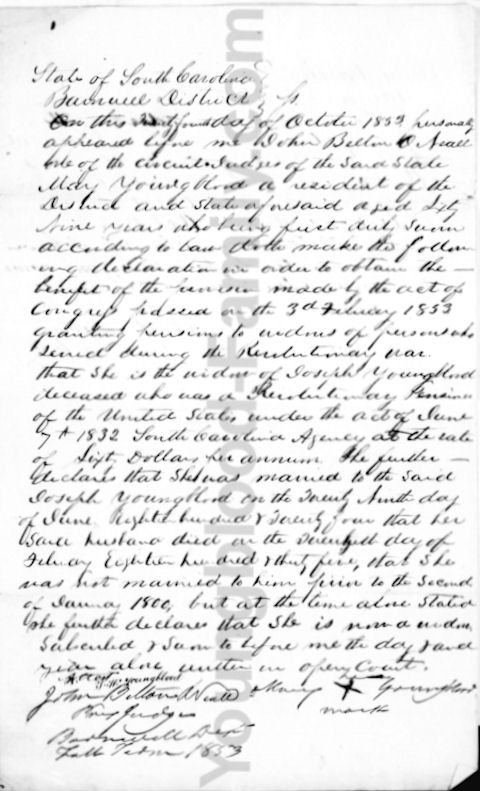Joseph Youngblood – Revolutionary War Soldier
For those cousins who are related to the Youngblood Family of Barnwell County, South Carolina and of Emanuel County, Georgia, one of your Youngblood ancestors was a Revolutionary War Soldier, which may qualify you for membership in the National Society, Children of the American Revolution – CAR, National Society, Daughters of the American Revolution – DAR or in the National Society, Sons of the American Revolution – SAR.
Jospeh and Margaret “Peggy” Youngblood were the progenitors of the Youngblood family of Barnwell County, South Carolina. They had five known sons: Bartlett Youngblood, Reason Youngblood, Samuel Youngblood, Jesse Youngblood and Washington Youngblood. Note: Reason and Samuel Youngblood both served as soldiers during the War of 1812.
Bartlett and Nancy Ann Riley Youngblood were the progenitors of the Youngblood family of Emanuel County, Georgia. Bartlett Youngblood was the father of Spencer Pinckney Youngblood, J. Henry Youngblood, Andrew Jackson Youngblood and several daughters, all of whom moved from Barnwell County, South Carolina, and settled in the area of Kemp, Emanuel County, Georgia.
Joseph Youngblood was a Revolutionary War soldier. He served in the South Carolina Militia after the fall of Charleston, South Carolina, enlisting as a private, was promoted to Lieutenant and then was promoted to the rank of Captain. He served under Colonel LeRoy Hammond.
Joseph Youngblood’s Revolutionary War service record is on file with the South Carolina Department of Archives and History, located at Columbia, South Carolina and in the book “Roster of South Carolina Patriots in the American Revolution” and in the book “STUB ENTRIES To INDENTS ISSUED IN PAYMENT OF Claims Against South Carolina Growing Out of the Revolution”, under Audited Accounts # 8872 and Indents # U131.
Joseph Youngblood is also referenced in the records of the South Carolina Department of Archives and History, located at Columbia, South Carolina and in the book “Roster of South Carolina Patriots in the American Revolution”, in the records of John Randall, Revolutionary War soldier, under Audited Accounts # 6241, which states that John Randall “While residing in Edgefield District, he enlisted during 1778 and served as a private and lieutenant under Col. LeRoy Hammond and Capts. Samuel Sinquefield, John Hammond, Jr., Joseph Youngblood, and John Ryans.”
On July 7, 1785, Joseph Youngblood received an indented certificate from the Commissioners of the Treasury, of the State of South Carolina for duty done in the militia as a Revolutionary War soldier, amounting to sixty-seven pounds, seven shillings and ten pence farthing Sterling, plus interest. This indented certificate is listed as no. 131 in book U. It is also listed in the book “STUB ENTRIES To INDENTS ISSUED IN PAYMENT OF Claims Against South Carolina Growing Out of the Revolution” as No. 131, Book U.
Thereafter, when pensions were enacted by law for Revolutionary War soldiers by the South Carolina legislature, Joseph Youngblood received a yearly pension for his services as a Revolutionary War soldier from the State of South Carolina in the amount of $60.00 per year, until his death in 1835.
Joseph Youngblood’s wife, Margaret died sometime between 1820 and June 29, 1824, the date when Joseph Youngblood married his second wife, Mary. Joseph Youngblood died on February 20, 1835 near Williston, Barnwell County, South Carolina.
After the death of Joseph Youngblood in 1835, his second wife, Mary, petitioned for a Revolutionary War Widow’s Pension. However, the law for Revolutionary War Widows only applied to widows who were married to a soldier during his period of war service. Since his second wife, Mary, was married to Joseph Youngblood in the year 1824, her petition for a widow’s pension was rejected.
On October 24, 1853, Mary Youngblood, widow of Joseph Youngblood, petitioned the US Federal Governement for a Widow’s Pension under an Act of Congress passed on February 3, 1853.
On the 3rd of February, 1853, Congress passed an act granting pensions to widows of Revolutionary Soldiers, but it included a provision about the marriage date of the widow; as thus: “no widow married after the 1st day of January, 1800, should be entitled to receive a pension under the act.”
On the 23rd of February, 1853, Congress passed another act which removed the requirement that a widows marriage date must have been before the 1st day of January, 1800; as thus: “And be it further enacted, that the widows of all officers, noncommissioned officers, musicians, and privates of the Revolutionary army who were married subsequently to January, A.D. 1800, shall be entitled to a pension in the same manner as those who were married before that date.”
Because Joseph Youngblood was a Revolutionary War Soldier Pensioner of the State of South Carolina, the US Federal Government had no records on Joseph Youngblood in its Federal files but noted in the widow’s pension application files of Mary Youngblood, that Joseph Youngblood may have been a state pensioner.
Regardless, it appears that Mary Youngblood never received a widow’s pension that was due her based upon Joseph Youngblood’s Revolutionary War service.
In 1854, Bartlett Youngblood, son of Joseph Youngblood, and his immediate family moved from Barnwell County, South Carolina to Kemp, Emanuel County, Georgia.
In 1857, Spencer Pinckney Youngblood, son of Bartlett Youngblood, and his immediate family moved from Barnwell County, South Carolina to Kemp, Emanuel County, Georgia, near his father, Bartlett Youngblood.
Below is listed a copy of the Indented Certificate No. 131 issued to Joseph Youngblood for his services as a Revolutionary War soldier:
Below are listed some of Joseph Youngblood’s pension receipts for his services as a Revolutionary War soldier:
Below is listed a copy of the application of Mary Youngblood, widow of Joseph Youngblood, for a widow’s pension dated October 24, 1853 and filed pursuant to an Act of Congress passed on the February 3, 1853 granting pensions to widows of Revolutionary War soldiers:



